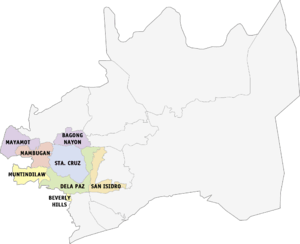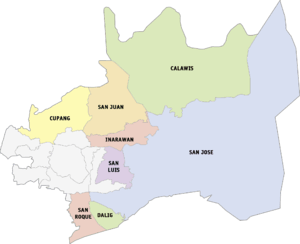Legislative districts of Antipolo
 |
| This article is part of a series on the politics and government of the Philippines |
|
Legislature
|
|
Constitutional Commissions |
The Legislative districts of Antipolo City, namely the first and second congressional districts, are the current representations of the city of Antipolo in the lower house of the Congress of the Philippines.
From 1907 to 1972, Antipolo was represented in the various national legislatures as part of the second district of Rizal. Antipolo, along with the rest of the province of Rizal, was represented in the Interim Batasang Pambansa as part of Region IV-A from 1978 to 1984. The province of Rizal elected two representatives at-large to the Regular Batasang Pambansa in 1984.
Antipolo was placed in the first district of Rizal after the reorganization of the province's legislative districts under the new Constitution which was proclaimed on February 11, 1987. Upon its conversion into a city through Republic Act No. 8508 (approved on February 13, 1998; ratified on April 4, 1998), Antipolo was separated from the first district of Rizal and elected its own representative starting in the 1998 elections.
The city was further divided into two congressional districts on December 22, 2003, by virtue of Republic Act No. 9232; each elected their own representative beginning in 2004.
1st District

- Barangays: Bagong Nayon, Beverly Hills, De La Paz, Mambugan, Mayamot, Munting Dilao, San Isidro, Santa Cruz
- Population (2010): 327,628
| Period | Representative |
|---|---|
2004–2007 |
|
2007–2010 |
|
2010–2013 | |
2013–2016 | |
2016–2019 |
- ^1 Appointed Secretary of Interior and Local Government on February 5, 2006.
2nd District

- Barangays: Calawis, Cupang, Dalig, Inarawan, San Jose, San Juan, San Luis, San Roque
- Population (2010): 350,103
| Period | Representative |
|---|---|
2004–2007 |
|
2007–2010 |
|
2010–2013 |
|
2013–2016 | |
2016–2019 |
Lone District (defunct)
| Period | Representative |
|---|---|
1998–2001 |
|
2001–2004 |
See also
References
- Philippine House of Representatives Congressional Library